Artificial intelligence (AI) has been a growing subject of focus in payments and beyond. We review major cross-border payments’ historic and current earnings to determine how the industry is changing its approach to the technology.
AI has been a subject of discussion in cross-border payments for some time, with the technology enjoying increased focus in industry commentary, at events and in media. It has also had a genuine place in how the industry functions, particularly around relatively long-established applications related to fraud and know-your-customer (KYC).
From a topic perspective, focus on AI has come in cycles. Over the past decade or so we have seen AI’s less sophisticated cousin, machine learning, gain increased focus, before being overtaken by AI itself. The most recent stage in the cycle, however, has been the emergence of excitement around generative AI, brought about by the rise of accessible generative AI technologies such as OpenAI’s ChatGPT.
It certainly seems as if AI has been a subject of not only increased discussion, but increased activity in payments over the past year or so. Questions remain though: how much of that is pure hype? And how much is translating into meaningful action designed to impact the bottom lines of cross-border payments players?
In this report, we look at the earnings call transcripts of major publicly traded payments companies to assess how their approach to AI has changed in the past and continues to change in FY 2023 and beyond. This saw us review the quarterly earnings reports of 16 players from across the cross-border payments industry between Q1 2020 and Q4 2023. Of these, 13 were public for the entirety of the period and three were public from 2021 onwards.
In doing so, we have not only seen a significant uptick in the discussion of AI, but a shift in how payments players are discussing the technology.
The growth in AI discussion among payments companies
Across full years 2021, 2022 and 2023 – the period where all 16 companies reviewed were publicly traded – there has been a clear rise in discussion of artificial intelligence in earnings calls.
While seven of the 16 payments companies (44%) mentioned AI at least once in both 2021 and 2022, in 2023 this had risen to 12 (75%). Out of the 16 companies, only four made no mention of AI in any earnings in 2023.
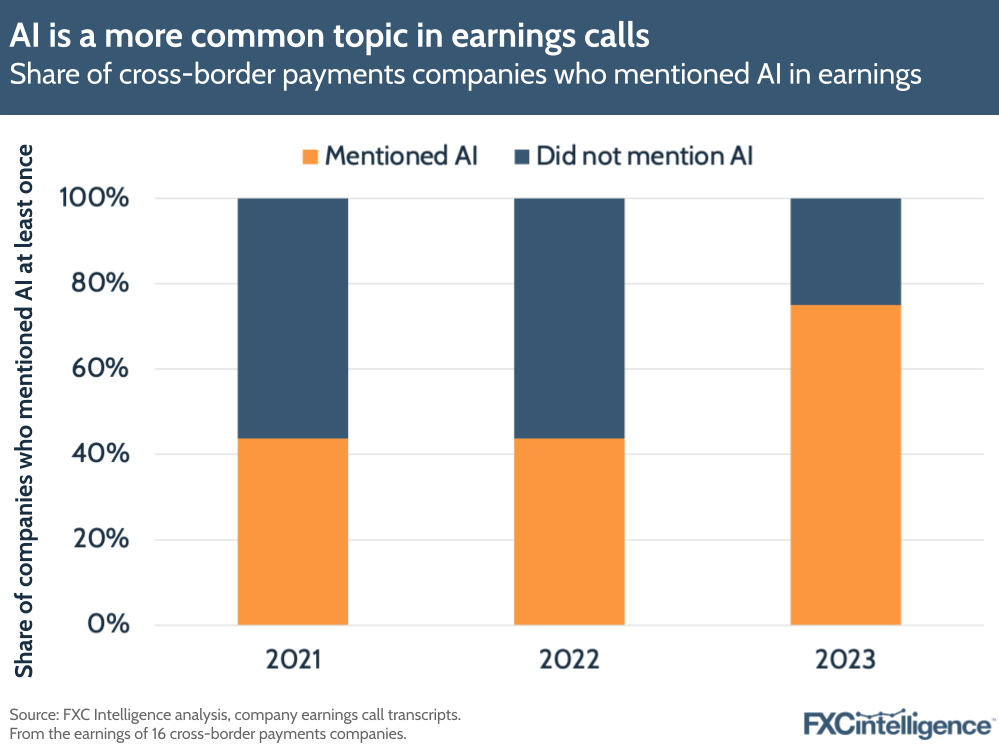
Within this, while there was variation across quarters, the rise in the number of companies who mentioned AI in any given quarter of 2023 was also markedly higher than in 2021 or 2022, with no one quarter seeing less than six companies out of the 16 mentioning AI; Q1 2023 saw the most mentions, at eight companies.
We also saw mentions of machine learning slightly increase in 2023 after a dip in 2022. Meanwhile, having had no mentions prior to 2023, generative AI saw a notable increase across the year.
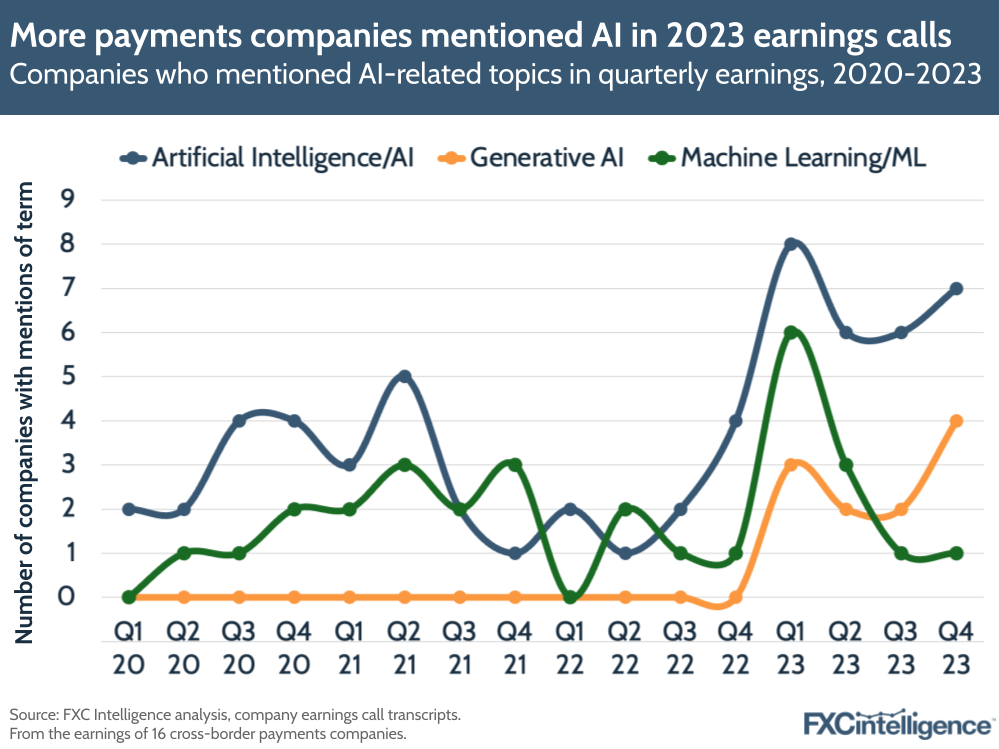
These trends were also reflected in the frequency of mentions. While the number of companies mentioning AI in 2023 increased, the frequency of mentions increased more sharply – showing that not only are more companies now discussing the technology, but they are discussing it more frequently.
While mentions of AI remained relatively flat between 2021 and 2022, they climbed dramatically in 2023, increasing by a rate of 1,170% year-on-year.
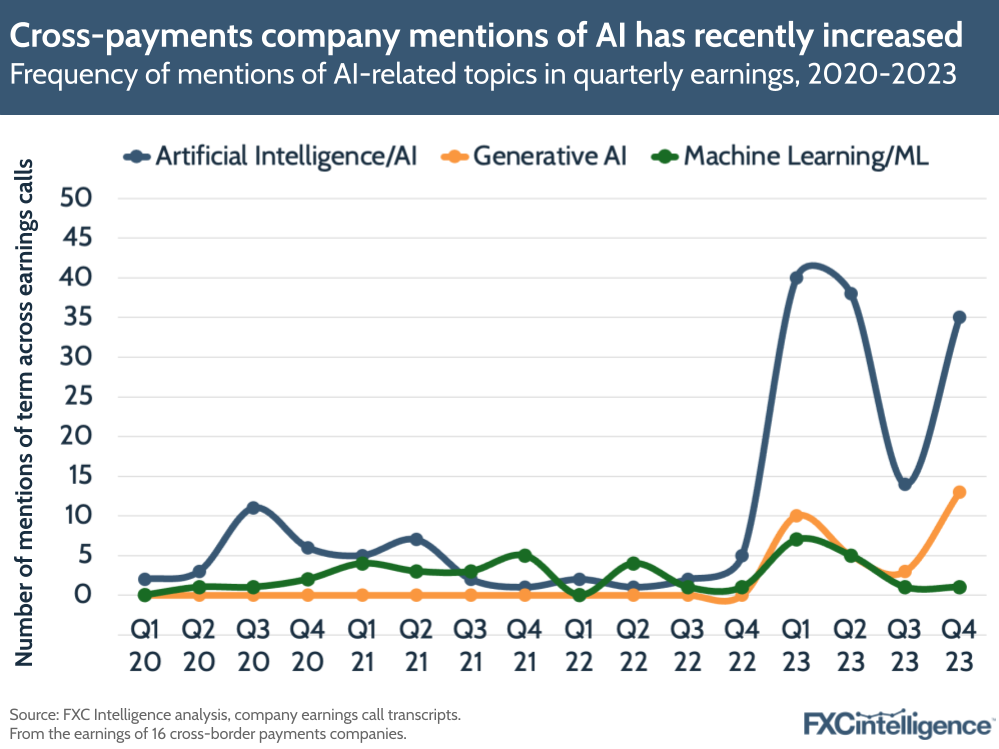
The cross-border payments companies leading discussions
While most companies mentioned AI at some point across their four earnings calls in 2023, the frequency of mentions varied significantly by player.
In the lead was PayPal, which referenced AI across all four earnings calls, with a combined total of 29 mentions. It also directly mentioned machine learning and generative AI in some quarters. However, there was a notable difference in the rate of mentions between CEOs. While Q1 and Q2 earnings calls were led by then long-time CEO Dan Schulman, Q3 and Q4 were helmed by new CEO Alex Chriss; under Schulman AI mentions in 2023 totalled 24, while under Chriss they totalled just five.
Mastercard came in second, with Visa closely following in third, while Square and Cash App owner Block came in joint fourth with payments processor Worldline.
In general, companies in payments processing and related areas generally saw higher rates of AI mentions compared to payments companies who focus on consumer money transfers or B2B payments, and those with no AI mentions were largely in C2C and B2B payments.
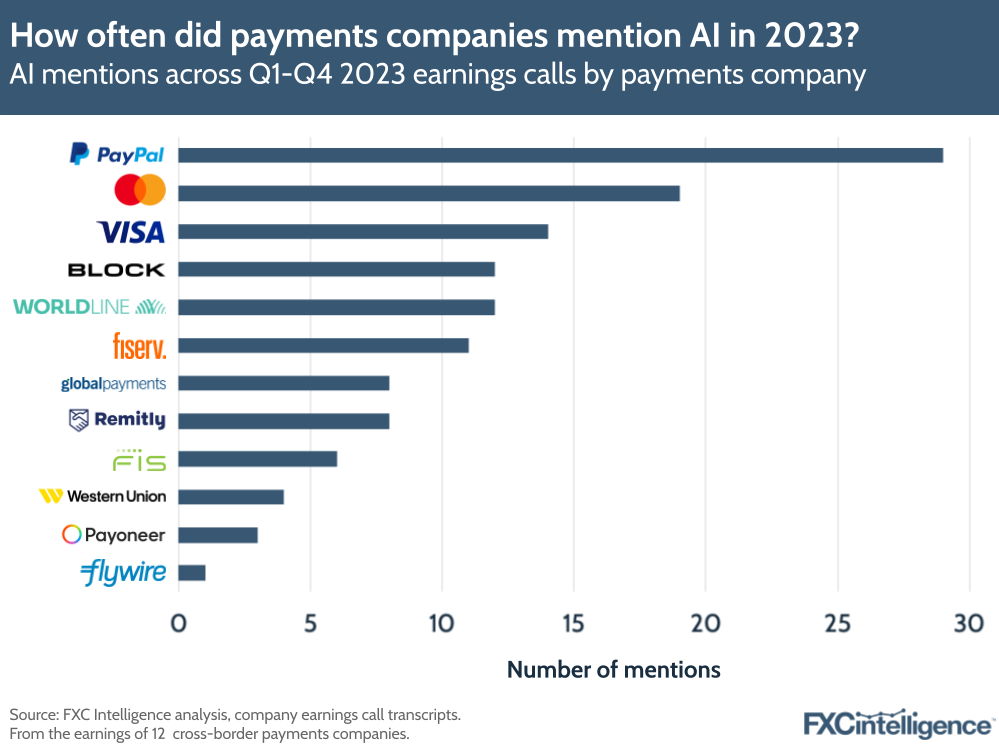
Interestingly, only one company out of the 12, Mastercard, mentioned AI in every quarter of 2023. Most players dedicated a significant section of a single call to discussing their AI initiatives, often following up with additional briefer mentions in later calls. This approach was followed by Visa, FIS and Worldline, while Remitly, Fiserv, Western Union and Global Payments chose to focus their discussion in their FY/Q4 earnings call.
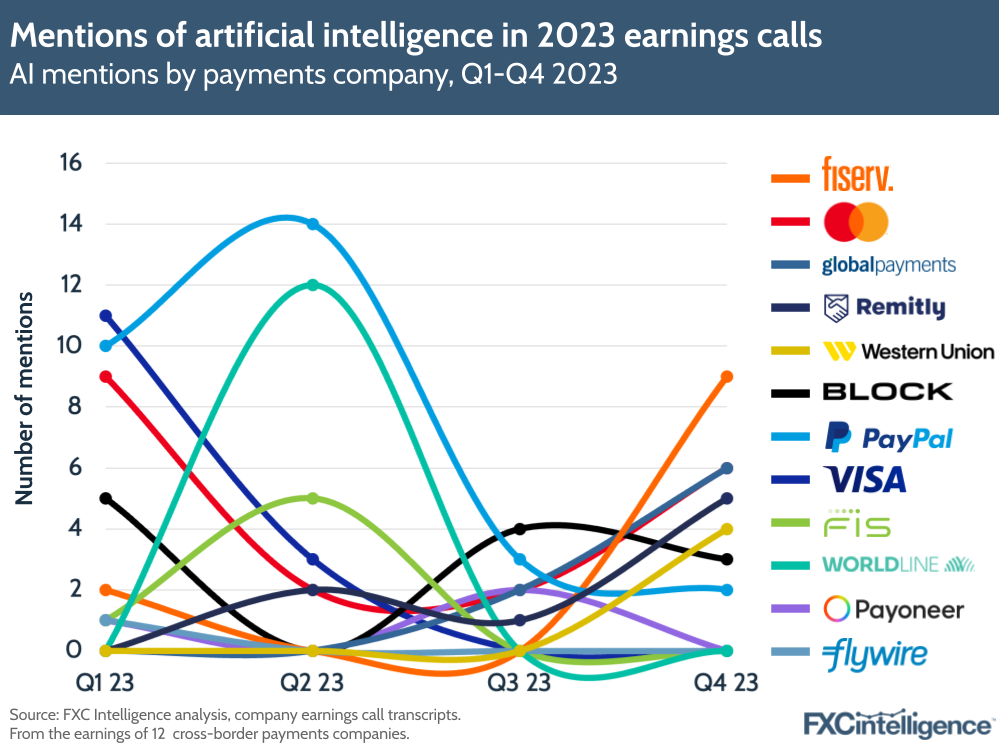
The rise of generative AI
Generative AI, which has been one of the biggest drivers of AI in general’s return to prominence, also saw interesting trends in 2023, the first year it has seen mentions by any of the payments companies reviewed for this report.
Here, Mastercard was the leader in mentions, followed by Global Payments in second and Visa and Worldline in joint third. As a newer technology, discussions of this largely focused on in-development or future initiatives; while not all players who mentioned AI discussed generative AI by name, nine of the 12 (75%) mentioned it during one of their four 2023 earnings calls.
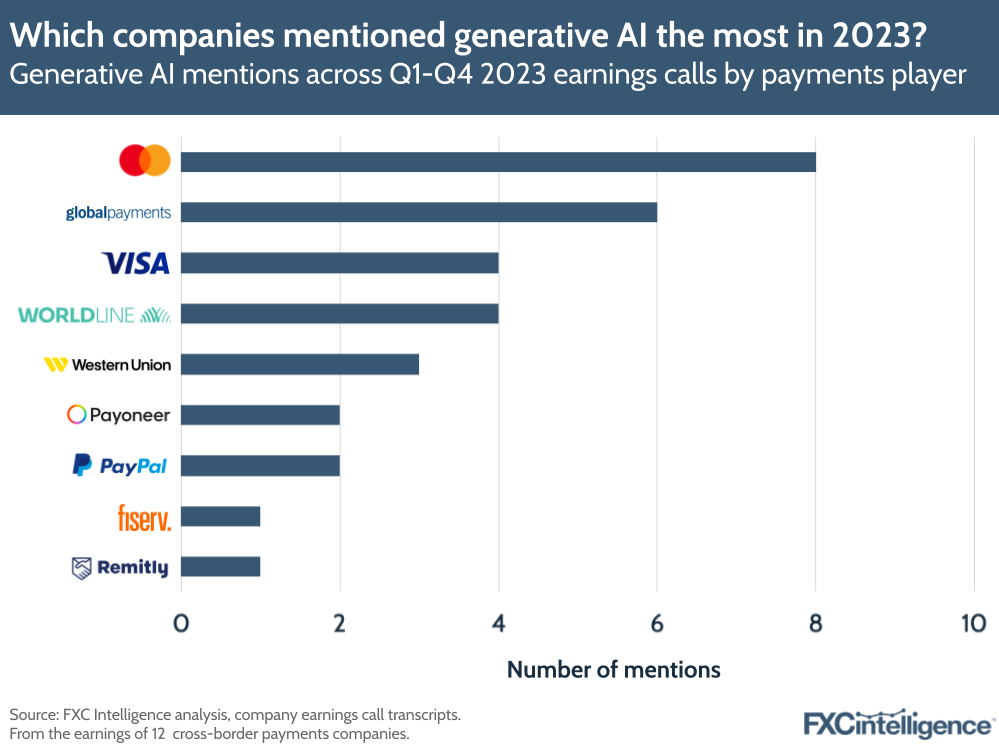
Of those nine, no one player consistently mentioned generative AI throughout the year – suggesting that it is something to highlight around specific initiatives rather than something that has been fully embedded into existing business operations.
Generative AI was also more commonly mentioned in payment companies’ Q1 or Q4 earnings calls, when players are more likely to outline longer-term strategy – a potential reflection of the technology’s position as something being explored or considered, rather than a technology being fully used in day-to-day activities.
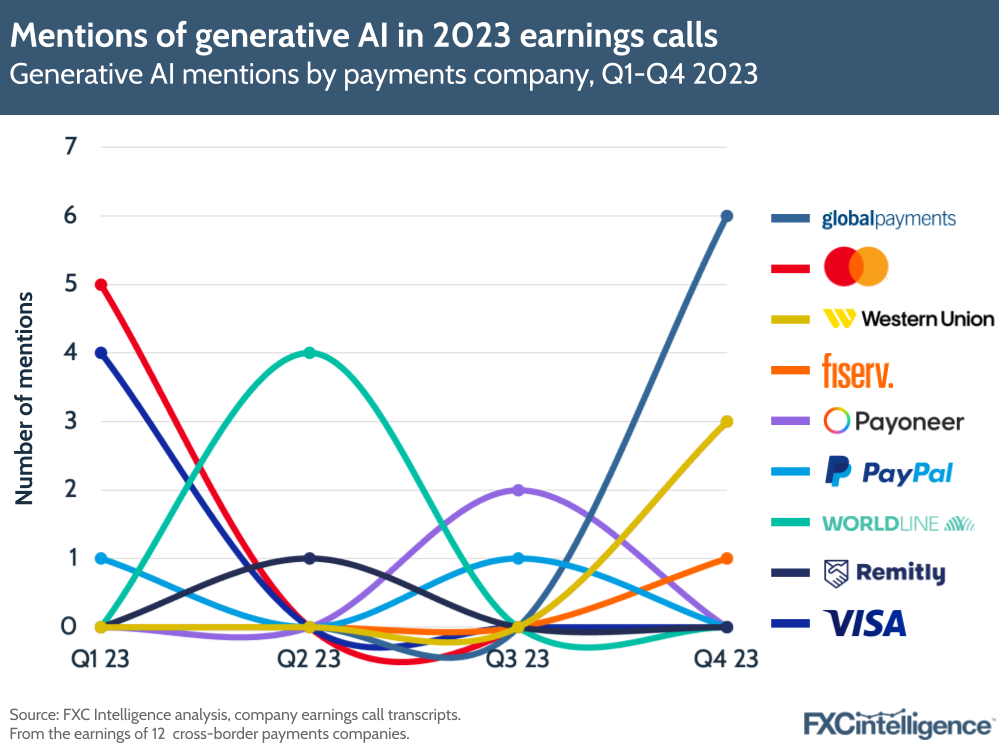
What are the main applications of AI for payments companies?
The rise of generative AI has also coincided with a greater shift in discussion of future applications for AI, relative to discussion of its current use.
While all quarters saw a blend of discussion of the technology both in terms of current initiatives and those either proposed or in development, future applications went from being less than half in Q1 2023 to being over 60% of discussions by Q4 2023.
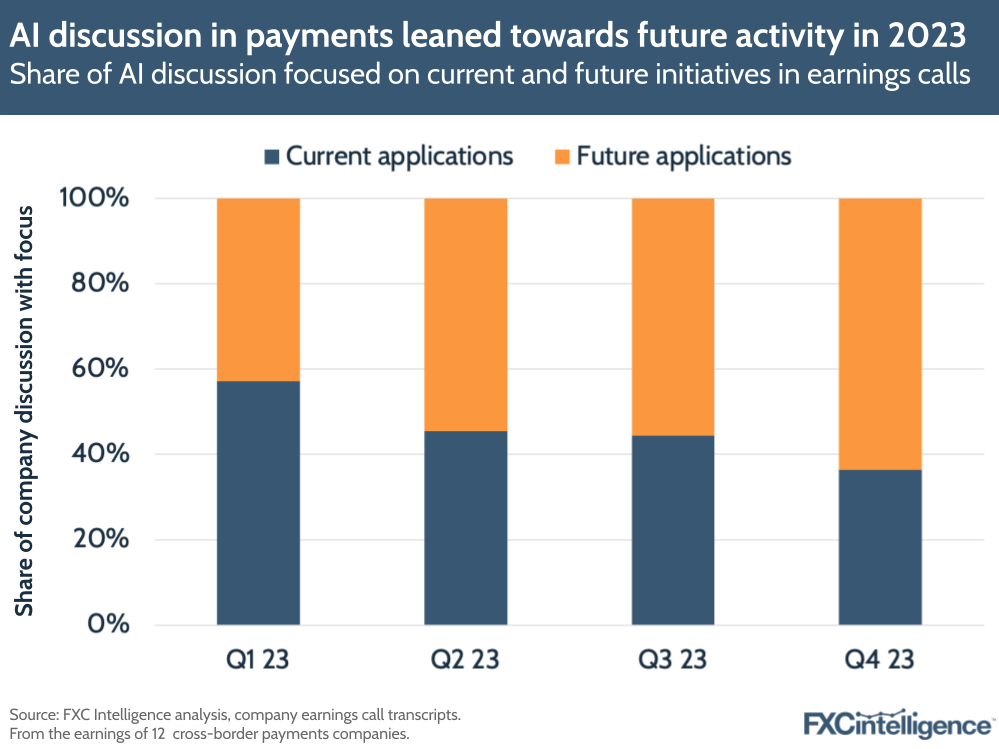
Meanwhile, the potential application areas of AI also split across the year. Here, almost all discussion can be categorised into one of three areas:
- Fraud protection and risk management, which is typically associated with areas such as KYC and other customer verification and identification of security issues. As a long-established use of AI in payments and beyond, this is the most traditional area of focus, and is much more associated with non-generative AI.
- Customer service and experience, which focuses on finding ways to handle elements of the customer service process with AI. Here, applications such as chatbots have already become well-established among payments companies and beyond, although generative AI is now providing potential ways to considerably enhance this process and further reduce the need for human support.
- Productivity and cost gains, which focuses on finding efficiencies across operations through the use of AI. Here, generative AI is a particular area of interest, as it has the potential to notably improve productivity in areas that would not have been a focus for earlier versions of the technology.
While discussion of all three areas was seen across the year, with many companies discussing multiple application areas within a single call, we do see increased focus on the second two applications as attention on generative AI increased.
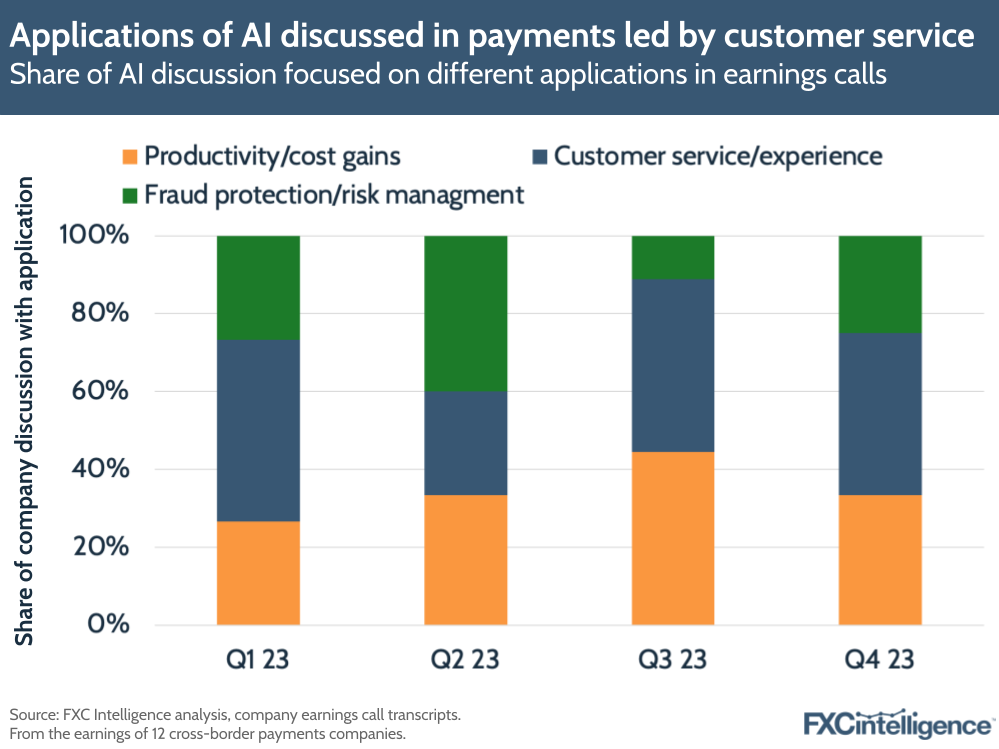
This is also somewhat reflected in the split of applications by timescale. While all three application types saw discussion in terms of both current and future projects across the course of 2023, more than half of those focused around fraud protection and risk management addressed current projects. Meanwhile, over half of the other two categories focused more on future initiatives.
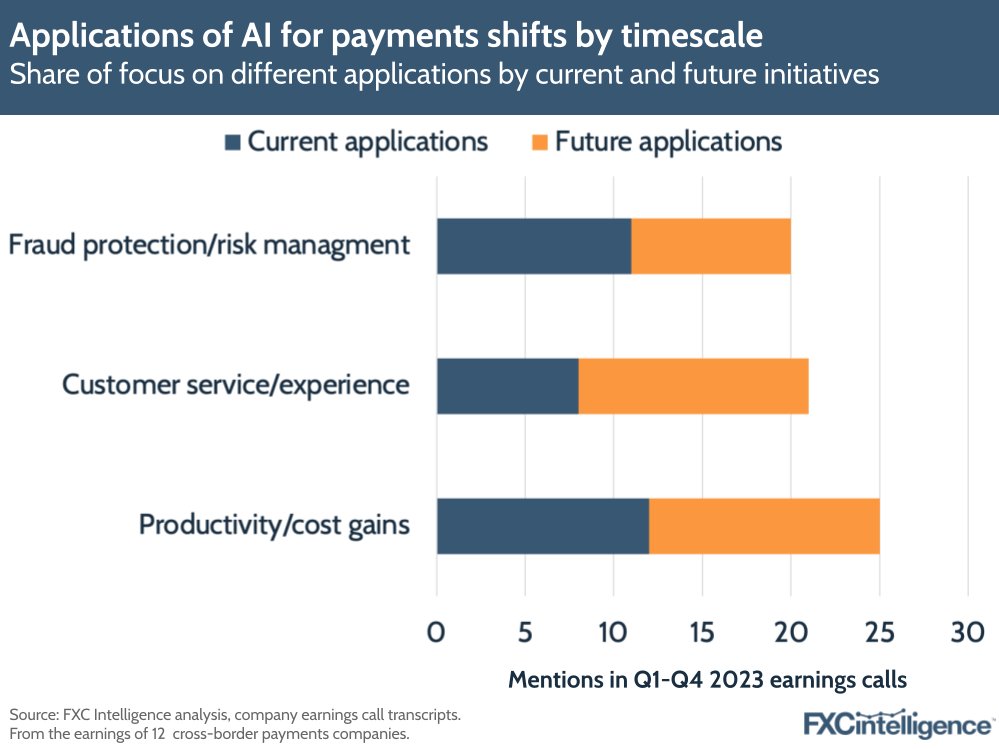
Despite some areas being more popular than others, all players discussed existing projects or plans across multiple applications. In most cases, AI discussion focused on both current and future applications, although there were exceptions to this.
For example, Flywire focused exclusively on its existing uses of AI, while both FIS and Western Union spoke only of the technology in terms of its future use. Others, meanwhile, made reference to all three application groups across both current and future uses, with both Payoneer and Fiserv being examples of this approach.
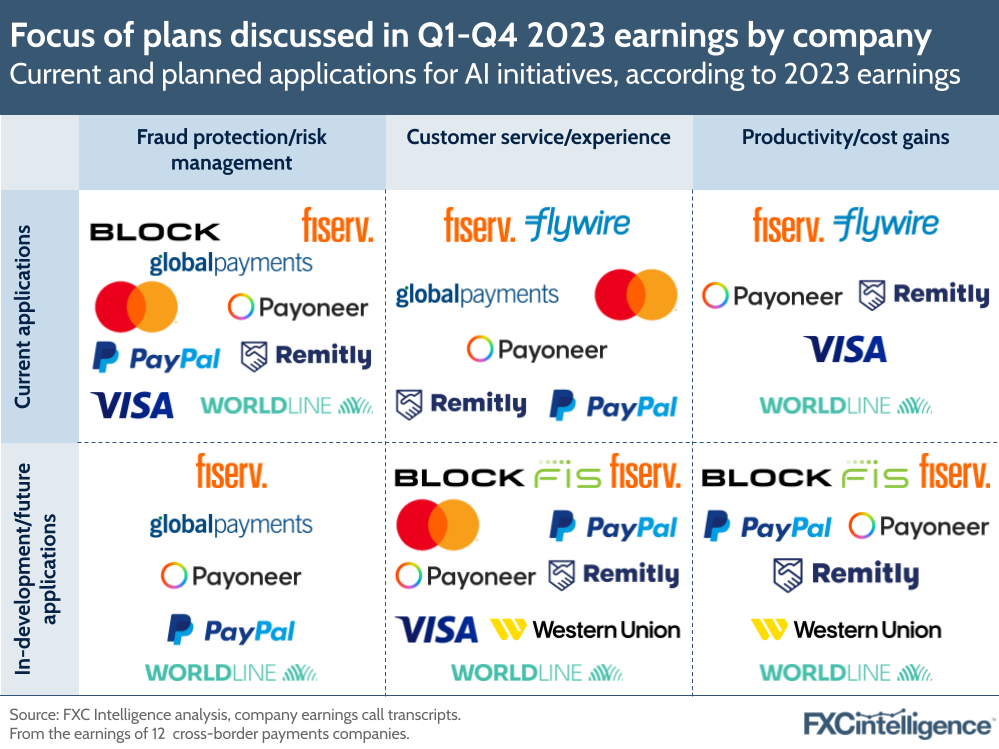
Is AI here to stay?
It’s clear that the cross-border payments industry has seen a significant uptick in interest in AI in 2023, and the strength of discussion in Q4 2023 suggests that this is set to continue into 2024. The number of projects discussed both as in-development or in the future also suggests we are likely to hear far more from payments players in the future on this topic.
However, whether the use of AI ultimately proves to be a bubble, or a technology that becomes so ubiquitous it falls out of frequent discussion remains to be seen. The industry has seen past examples of both. Blockchain, for example, has faded without gaining strong traction among many players, while technologies such as the cloud started off as hype-fuelled topics but are now essential parts of business operations.
The breadth of potential for AI, as well as its already well-established existing use in some areas, strongly suggests that AI will be in the latter camp in some form. However, whether that includes generative AI – and in particular whether it applies to such a broad range of business areas – is not yet clear.
Just as 2023 was a significant year in driving up focus on AI in the payments space, 2024 will be pivotal in determining to what extent it remains at the forefront of companies’, and investors’, attention.



